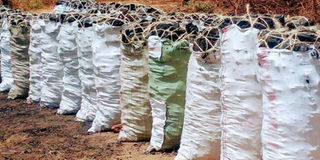With a rich energy mix, country can tame heated charcoal conflict

Charcoal impounded in Kajiado County recently. Our population is exploding at a terrific rate, making reliance on charcoal unsustainable. FILE PHOTO | NATION MEDIA GROUP
What you need to know:
As resources run out, energy becomes premium, attracting territorial wars.
The heat from geothermal steam is fantastic for industrial processes.
A study indicated that methane from Dandora can generate up to 170 megawatts of electricity.
The recent past has witnessed dramatic events connected to charcoal.
A charcoal-laden lorry was razed in Kitui and, later, some youths blocked the Nairobi-Nakuru highway and visited havoc on motorists — to “avenge” the attack.
The pandemonium manifests deep undercurrents in the informal energy sector.
It is a warning shot of dwindling resources and a pointer to ugly things to come if radical and practical solutions are not sought to ensure sustainable and affordable energy.
Charcoal is, no doubt, an extremely lucrative enterprise, estimated at a staggering Sh40 billion a year.
So profitable it is that efforts to tame its trade are frustrated by deeply entrenched interests and ignorance.
But we conveniently forget that it is sourced from a finite resource.
Our earth is shaven clean faster than it can replenish itself. The golden age of charcoal and wood fuel is behind us.
ENERGY POVERTY
More worrying, however, is that energy poverty is a powder keg. As resources run out, energy becomes premium, attracting territorial wars.
We need to enrich and strengthen our energy mix, especially that accessible to the masses.
Further, our population is exploding at a terrific rate, making reliance on charcoal unsustainable. We need vibrant frameworks for renewable energy that will be abundantly available to every homestead.
But that energy has to be affordable and, of course, clean.
Indeed, the Jubilee administration is aware of this reality; that is why, for the first time, we have a principal secretary in charge of renewables. I’ve no doubt in my mind that Prof Colleta Suda will reinvigorate the portfolio.
With a future firmly focused on sufficient electricity, we now need efficient cooking equipment that will consume less power. Such gadgets, suitable for our continent, should be accessible to the majority at very competitive prices — if need be, even with government subsidies.
RELIANCE ON CHARCOAL
This way, we will reduce reliance on charcoal, have a well-structured and streamlined energy regime and, importantly, save our forests.
As I have indicated in these pages before, the heat from geothermal steam is fantastic for industrial processes.
Heating boilers will be cheaper and will also reduce pressure on wood fuel or heavy diesel, which is being used. But there are also umpteen opportunities at our disposal, especially for domestic purposes.
We need more robust approaches towards the utilisation of solar energy even for cooking, which is in abundance.
More families should also turn to biogas, which is clean. In rural areas, for instance, cow dung is in plenty. We should have programmes to encourage biogas digester uptake. Then there is the city and its waste.
In Nairobi, about half of the 3,000 tonnes of municipal solid waste is organic material. Such is a golden opportunity to capture the methane gas and supply to low-income earners.
A study indicated that methane from Dandora can generate up to 170 megawatts of electricity.
Thankfully, recently, a title deed for the land was secured and, probably, Nairobi will have its first methane-fired power plant of such a scale.
EASE PRESSURE
Making briquettes and wood pallets from waste biomass is another great opportunity to ease pressure on charcoal.
Also, Keekonyokie slaughterhouse in Ngong Town is experimenting with packaging biogas for sale at subsidised prices.
If taken on an industrial scale, the above will also provide employment opportunities for many Kenyans.
With Kenya having ratified the Paris Agreement on Climate Change, which binds us towards renewable energy, I am optimistic that geothermal power generation will get its deserved attention and funding to stem the cost of electricity and reduce carbon emissions.
Mr Nchoe, an engineer, is the managing director and CEO, Geothermal Development Company. [email protected]




